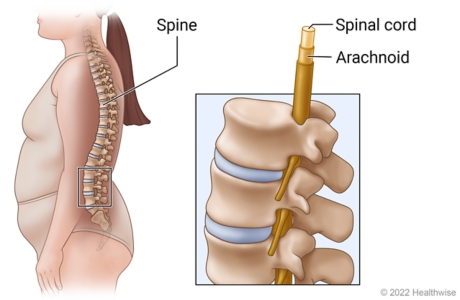Our Health Library information does not replace the advice of a doctor. Please be advised that this information is made available to assist our patients to learn more about their health. Our providers may not see and/or treat all topics found herein.
Topic Contents
Arachnoiditis
Overview

Arachnoiditis (say "uh-rak-noy-DY-tus") is inflammation of a membrane (called the arachnoid) that surrounds the spinal cord. The inflammation may be ongoing (chronic). This can cause scar tissue near the spinal cord. It can cause nerve roots to stick together and not work as they should. Symptoms may include numbness, tingling, or pain in the back and legs. The condition is rare.
It can be caused by:
- Trauma. This includes spinal surgery and injections into the spinal cord. These may include spinal or epidural injections.
- Chemicals. Examples are chemotherapy and contrast material.
- Infections.
An MRI scan of the spine can help diagnose arachnoiditis.
Treatment focuses on managing symptoms.
Symptoms
Symptoms may include:
- Low back numbness, tingling, burning, or pain.
- Headaches.
- Muscle spasms and cramps in the back and legs.
- Constipation.
- Problems urinating.
- Problems with sex.
- In severe cases, muscle weakness or paralysis.
Treatment
Treatment focuses on managing symptoms and improving your function. There is no way to reverse the scarring. Symptoms may be managed with medicine, physical therapy, and counseling. Sometimes spinal cord stimulation is used for pain. Surgery is rarely part of treatment. For some people, it may be an option.
Related Information
Credits
Current as of: December 3, 2024
Author: Ignite Healthwise, LLC Staff
Clinical Review Board
All Ignite Healthwise, LLC education is reviewed by a team that includes physicians, nurses, advanced practitioners, registered dieticians, and other healthcare professionals.
Current as of: December 3, 2024
Author: Ignite Healthwise, LLC Staff
Clinical Review Board
All Ignite Healthwise, LLC education is reviewed by a team that includes physicians, nurses, advanced practitioners, registered dieticians, and other healthcare professionals.
This information does not replace the advice of a doctor. Ignite Healthwise, LLC disclaims any warranty or liability for your use of this information. Your use of this information means that you agree to the Terms of Use and Privacy Policy. Learn how we develop our content.
To learn more about Ignite Healthwise, LLC, visit webmdignite.com.
© 2024-2025 Ignite Healthwise, LLC.


